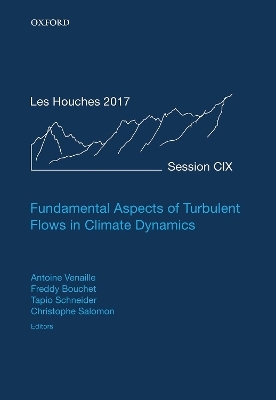
Fundamental Aspects of Turbulent Flows in Climate Dynamics
Lecture Notes of the Les Houches Summer School: Volume 109, August 2017
Seiten
2020
Oxford University Press (Verlag)
978-0-19-885521-7 (ISBN)
Oxford University Press (Verlag)
978-0-19-885521-7 (ISBN)
This volume, number 109 of the Les Houches Summer School series, presents the lectures held in August 2017 on the subject of turbulent flows in climate dynamics.
Leading scientists in the fields of climate dynamics, atmosphere and ocean dynamics, geophysical fluid dynamics, physics and non-linear sciences present their views on this fast growing and interdisciplinary field of research, by venturing upon fundamental problems of atmospheric convection, clouds, large scale circulation, and predictability.
Climate is controlled by turbulent flows. Turbulent motions are responsible for the bulk of the transport of energy, momentum, and water vapor in the atmosphere, which determine the distribution of temperature, winds, and precipitation on Earth. The aim of this book is to survey what is known about how turbulent flows control climate, what role they may play in climate change, and to outline where progress in this important area can be expected, given today's computational and observational capabilities.
This book reviews the state-of-the-art developments in this field and provides an essential background to future studies. All chapters are written from a pedagogical perspective, making the book accessible to masters and PhD students and all researchers wishing to enter this field.
Leading scientists in the fields of climate dynamics, atmosphere and ocean dynamics, geophysical fluid dynamics, physics and non-linear sciences present their views on this fast growing and interdisciplinary field of research, by venturing upon fundamental problems of atmospheric convection, clouds, large scale circulation, and predictability.
Climate is controlled by turbulent flows. Turbulent motions are responsible for the bulk of the transport of energy, momentum, and water vapor in the atmosphere, which determine the distribution of temperature, winds, and precipitation on Earth. The aim of this book is to survey what is known about how turbulent flows control climate, what role they may play in climate change, and to outline where progress in this important area can be expected, given today's computational and observational capabilities.
This book reviews the state-of-the-art developments in this field and provides an essential background to future studies. All chapters are written from a pedagogical perspective, making the book accessible to masters and PhD students and all researchers wishing to enter this field.
Freddy Bouchet, Principal Investigator of European Research Council, Directeur de recherche au CNRS, Lyon, France. Tapio Schneider, California Institute of Technology, Senior Research Scientist, Jet Propulsion Laboratory, Pasadena, USA. Antoine Venaille, Chargé de Recherche au CNRS, Laboratoire de physique, ENS de Lyon, France. Christophe Salomon, Directeur de Recherche au CNRS, Laboratoire Kastler Brossel, Ecole Normale Supérieure, Paris, France.
1: David M. Romps: Theory of Tropical Moist Convection
2: Caroline Muller: Clouds in current and in a warming climate
3: Henk A. Dijkstra: Dynamical System Approaches to climate variability
4: Theodor Shepherd: Barotropic aspects of large-scale atmospheric turbulence
| Erscheinungsdatum | 20.03.2020 |
|---|---|
| Reihe/Serie | Lecture Notes of the Les Houches Summer School ; 109 |
| Zusatzinfo | 103 |
| Verlagsort | Oxford |
| Sprache | englisch |
| Maße | 174 x 252 mm |
| Gewicht | 636 g |
| Themenwelt | Naturwissenschaften ► Geowissenschaften ► Geologie |
| Naturwissenschaften ► Geowissenschaften ► Meteorologie / Klimatologie | |
| Naturwissenschaften ► Physik / Astronomie | |
| ISBN-10 | 0-19-885521-4 / 0198855214 |
| ISBN-13 | 978-0-19-885521-7 / 9780198855217 |
| Zustand | Neuware |
| Haben Sie eine Frage zum Produkt? |
Mehr entdecken
aus dem Bereich
aus dem Bereich


